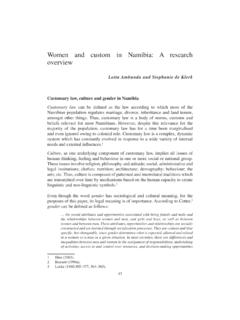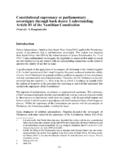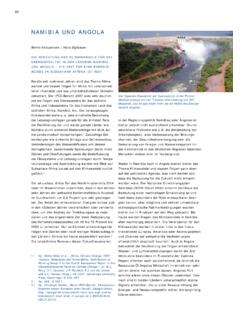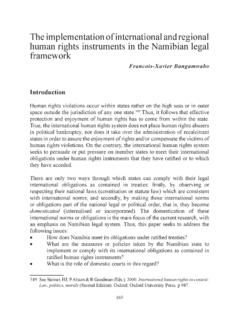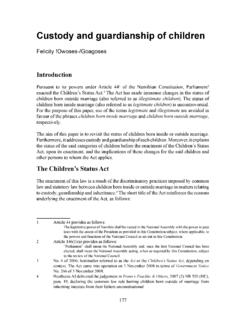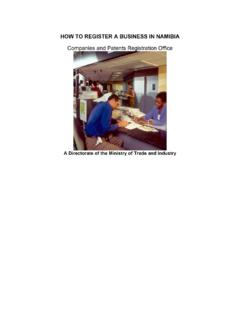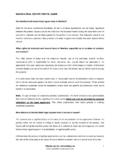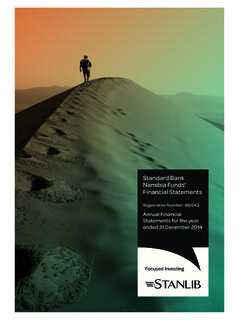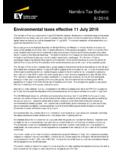Transcription of Traditional governance and African customary law ...
1 59 Traditional governance and African customary law: comparative observations from a Namibian perspectiveManfred O HinzIntroduction85 The Traditional versus the modern, the modern in the Traditional , the Traditional in the modern: topics high on the agenda of scholars and politicians! Emphasising one s own (past) culture is widely practiced and part of political discourses at local, national and even international levels. The focus on one s own culture may serve different purposes. It may be a pretext for covering otherwise unacceptable behaviour or it may be used to legitimise political and societal strategies of identity (re-) of anthropology and sociology have been creative in interpreting political movements of this kind and in offering conceptualisations for their understanding. There are two important scientific discoveries that are of special interest to legal and political anthropology for the analysis of the re-appropriation of Traditional governance and customary law.
2 The first discovery is referred to as the invention of traditions,86 or more precisely: the societal enactment of practises based on and developed out of what is said to be tradition in that particular society. We know from working in the field of African customary law that there are rules, which Traditional authorities submit as having been in place since time immemorial,87 but are nevertheless results of recent legislative actions. That recent legislative acts are said to be in existence for long is only a contradiction for those who do not understand the operation of tradition as a socio-political 85 This article is the slightly extended version of a contribution made to the Conference Estado, Direito e Pluralismo Jur dico perspectives a partir do Sul Global, organized by the Centro de Estudos Sociais of the University of Coimbra, Portugal, on 10 May 2007, with which the Faculty of Law of the University of Namibia has a partnership.
3 The Portuguese version of the article will appear as part of the conference Cf. Hobsbawm, E., Ranger, T. (1983) (Eds) The invention of tradition. Cambridge: Cambridge University Since time immemorial is the formula used in Traditional context to ascertain legitimacy. Traditional governance and African customary law 60concept. As such, tradition can marry recent enactments with so-called tradition said to be in existence since time immemorial, as long as the enactments of today find their foundation in that the first discovery of repositioning tradition has its firm place in anthropology, the second is still in the phase of exploration. The fact that something appears to be Traditional , but has nevertheless been recently created and integrated into the otherwise currently existing set of rules led scholars to speak of alternative Modernity has more than one face. Modernity is not just the one possible face, which is the opposite of pre-modernity or tradition.
4 This simplifying evolutionist model that knows, at the end of its evolutionist lane, only one mode of modernity and places the non-modern rest into the past of tradition does not do justice to the multiple choices cultures have in responding to realities. The concept of modernity that accepts the plurality of cultures irrespective of obviously universal trends of globalisation and cosmopolitanism as societal ways to accommodate the plurality of environments is necessarily multi-dimensional. However, accepting the plurality of modernities, will not render the use of modern and Traditional obsolete. We will, for the lack of better analytical concepts, but also in view of the fact that, for example, legislation employs the language of traditional90 (and with this implicitly of modern), still speak of something being modern and something else being Traditional . The fact that a given complex situation can be interpreted as part of an alternative modernity will still leave us with the need to analyse the given complexity and to identify within it elements that find their foundation in African tradition or in imported western modernity.
5 This analytical dissection will, however, not necessarily find an equivalent in the perception of people who live in their environments. In other words, the dissection will primarily be a tool for the interpretation of a given societal situation, but will not 88 Hinz, (1997a): Neither natural death nor suicide Traditional government in Namibia Remarks from experience. In Traditional leadership in Southern Africa. Johannesburg: Konrad-Adenauer-Stiftung, pp. De Sousa Santos, B. (2003), O estado heterog neo e o pluralism jur doco. In De Sousa Santos, B., Trindade, (Eds.) Conflito e trasforma o social: Uma paisagem das justi as em Mo ambique. Vol 1. Porto: Edi es Afrontamento, pp. 73ff; Ibid., ( 006) The heterogeneous state and legal plurality. In De Sousa Santos, B., Trindade, , Meneses, (Eds): Law and justice in a multicultural society. The case of Mozambique. Coimbra: Centro de Estudos Sociais, pp.
6 17ff. (18).90 Sec. 1 of the Traditional Authorities Act, 25 of 2000, of Namibia, which contains definitions important for the understanding of the act, uses the word tradition 35 times, the references to acts that have Traditional in its title not counted. Traditional governance and African customary law 6 automatically be a proper reflection of the consciousness in a society for which all dissected elements may form a well-structured following observations about the re-appropriation of Traditional governance and customary law are based on the two mentioned anthropological discoveries. They will take note of some developments in Southern Africa with the main focus on Namibia9 and some references to South Africa and a few to Angola. South Africa has been chosen (due to the common history which the two countries share), which nevertheless led into different political avenues after Namibia s independence and the change to democracy in South Africa.
7 Angola has been chosen because this country is at an interesting beginning in its efforts to determine an approach to its Traditional I divide my observations into five parts. After this introduction (1), I will, in the second part of this paper (2), describe five possible models, which I have developed to analyse the policies of governments to relate the inherited Traditional structures of governance to the structures of modernity as expressed in their constitutions. The case of Namibia will be looked at in the third part (3). Three special topics of this case study will be highlighted in the fourth part of the paper (4): namely, the interest of state governments to structure Traditional authorities; the governmental expectation to have mechanisms fort the linking of those authorities to the authorities of the state; and the Namibian nation-wide Traditional project to self-state93 customary law. Concluding remarks (5) will relate parts 2 to 4 back to the framework set out in the modelsThere is no African country that is free of African traditions or free of at least some elements that belong to western modernity.
8 It is therefore that African 9 Where the author of this article worked as legal adviser to the Ministry of Justice from 1990 to 1993 before joining the Faculty of Law of the University of Namibia in 1993 / 94 as professor of law. In both positions, Traditional governance and African customary law have been the main focus of Based on his experience with Namibia and South Africa, the author of this paper was asked to assist the Angolan parliament and non-governmental organisations in drafting proposals for the re-appropriation of Traditional governance and customary law in Angola. See Hinz, (2006e): Direito costumeiro pilot project proposal. Windhoek, Luanda (unpublished paper) and Ibid., (2006f): Proposal for the preparation of the white-paper process on Traditional authorities in Angola. Windhoek, Luanda (unpublished paper). 93 The meaning of self-stating customary law will be explained in part 4 of the paper.
9 Traditional governance and African customary law 6 governments have, in one way or the other, to make decisions about the legal and political position of both tradition and modernity in their social and legal Five models, or better: ideal types (Max Weber) are theoretically possible for the characterisation of the position of African tradition in a given society:95 The model of strong modern monismIn this model, African traditions are, by way of legislative act, abolished. Where the model of strong modern monism is adopted, the society could still know Traditional leaders. They would, from the political viewpoint however, be at no other level than other stakeholders and opinion leaders in the society. Traditional leaders would not form part of the overall governmental structure of the society. African customary law would not be accepted as law in the sense of law defined by the grundnorm of the given society.
10 The model of unregulated dualismIn this model, the state ignores (explicitly or implicitly) the existence of Traditional governance and African customary law, but tolerates both without formally confirming or recognising96 their existence, performance and There is a growing amount of literature that reflects the position of African governance in the modern African state. Cf. inter alia: Hofmeister, W., Scholz, I. (1997) (Eds.) Traditional and contemporary forms of local participation and self-government in Africa. Johannesburg: Konrad-Adenauer-Stiftung; Keulder, C. (2000) (Ed) State, society and democracy. A reader in Namibian politics. Windhoek: Gamsberg Macmillan; Oomen, B. (2005) Chiefs in South Africa. Law, power and culture in the post-apartheid era. Oxford Pietermaritzburg: James Curry, University of KwaZulu-Natal The following five models have been the topic of the author s research on Traditional authorities for some time.
